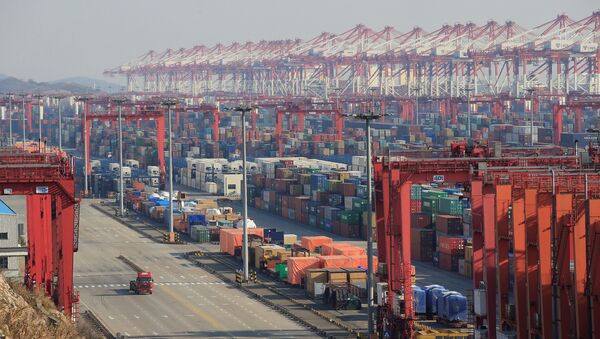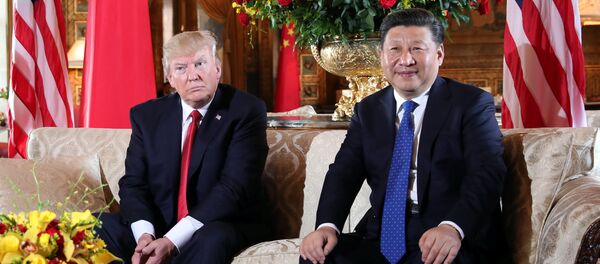Amid heated trade tensions with Beijing, US President Donald Trump plans to tighten existing constraints on Chinese investments in US technology firms and block additional technology exports to China, US press reported this week. The proposed new restrictions from the Trump administration are targeting Beijing’s ambitious "Made in China 2025" industry development plan that aims to turn China into a global leader in advanced technology.
Openness is the Key
Chinese economists warned that China should not focus solely on "indigenous innovation," which could lead to further technological isolation, and boost exchanges with other nations when facing further restrictions on obtaining advanced technology from the United States.
"I think it [the proposed restrictions] will have a negative impact on China’s technological advancement. China definitely needs to step up its efforts in indigenous innovation. But more importantly, we need to boost exchanges with other nations globally. I believe we cannot return to the era of a ‘closed system’ solely relying on ourselves. China needs to seek improvement in an open environment. It’s a unilateral action from the United States. We just need to try to find other partners or options," Cheng Dawei, a professor of economics at Renmin University in Beijing, who specializes in International Commercial Diplomacy and WTO related studies, told Sputnik.
The Chinese economist believes it is unlikely for other US allies such as member states of the European Union, Japan or South Korea to join the United States in introducing similar restrictions on technological exchanges with China.
READ MORE: Russia, India, China Will Isolate America in Trade Battle — Top Indian Economist
But US experts argued that China could face increased isolation, as officials in Europe start to understand the threat Beijing poses.
"They [China] are unlikely to be able to buy Japanese or South Korea firms. It is possible that China will unfairly gain foreign technology by buying European firms. But increasing European officials are waking up to that threat and may respond to limit it," Rob Atkinson, president of the Information Technology and Innovation Foundation, a Washington-based science and technology think tank, told Sputnik.
The US expert stressed that restrictions on Chinese investments in US technology firms meant to stop unfair Chinese practices of being an "innovation mercantilist."
"To be clear the steps are not to slow China’s advancement in technological innovation; they are to get China to stop cheating and using unfair means to get there. The restrictions on Chinese investment will help US authorities in two ways. The Chinese government subsidized acquisitions of US tech companies hurts US firms and helps Chinese firms. Moreover, restrictions on Chinese investment can be a bargaining tool to get the Chinese to roll back its rampant ‘innovation mercantilist’ practices. Fast-follower copying can be a very effective innovation strategy, and it is one that can take market share from global leaders," he said.
Falling Chinese Foreign Direct Investment in US
Before the Trump administration proposed further restrictions, the Committee on Foreign Investment in the United States (CFIUS) has already killed a number of planned Chinese acquisitions of US companies through the Foreign Investment Risk Review Modernization Act (FIRRMA).
The Chinese Foreign Direct Investment (FDI) in the United States dropped to only $1.8 billion in the first five months of this year, down 92 percent from the same period of the previous year and reaching the lowest level in seven years, consulting and research firm Rhodium Group said in a report earlier this month.
The proposed new restrictions could turn Chinese investors further away from the US markets, Atkinson warned.
"I would imagine that unless the Trump administration signals that is more open to Chinese investment Chinese investors will largely give up on investing in the United States, at least in terms of acquisitions of or investments in US companies, as opposed to new "greenfield" investment," he said.
Some US business consulting firms expressed concerns that restrictions on Chinese investments could cut off an important source of funding for US technology startups that rely on diverse sources of capital to help mitigate the risks associated with entrepreneurship. But Atkinson argued that Chinese investments are not vital for US firms.
READ MORE: Revenge on US Business Amid Trade War Not on China's Agenda — Reports
"US capital markets are vibrant enough that US firms don’t need Chinese investment. Moreover, most Chinese investment is a tool to transfer US technical capabilities to China. US firms are generally more advanced technologically than Chinese firms; they don’t need Chinese technology or financing," he said.
According to figures compiled by Rhodium Group, Chinese FDI in the United States only started to skyrocket in 2016, reaching a record high of $45.6 billion, tripling the total of $14.9 billion in 2015. But after Chinese authorities started to tackle capital outflow by curbing outbound investment, Chinese FDI in the United States fell by 35% in 2017 to $29 billion, accounting for 23.2 percent of overall Chinese outbound investment globally for that year.
Competing For Top Talent
As the nation seeks to become competitive in technology innovation, China started to attract more global talents and could possibly overtake the United States in the future, Cheng from Renmin University suggested.
"There’re more and more Chinese students who decide to return to China after finishing their studies abroad. They believe China is a more vibrant market. And more and more students from Japan, South Korea and countries under the One Belt and One Road Initiative came to China to study. I believe one day, there will be a turning point when China can become a leader in innovation globally," she said.
Cheng pointed out that tighter control in US immigration policy under the Trump administration could discourage some foreign students from choosing to stay in the United States.
However, US experts argued that the United States could continue to be an attractive destination for top researchers.
"Much more extensive individual rights, better control of one’s own research, cleaner air and water – most of the United States is a far better place to live and work than most of China," Derek Scissors, a China analyst at the Washington-based American Enterprise Institute think tank, told Sputnik.
Scissors stressed that the best way for the United States to maintain economic leadership is to focus on internal improvements.
"Right now the US economy is very strong but the federal government is still borrowing heavily. That is money we will need later for research spending, yet we are wasting it now," he said.
The expert added that limiting China cannot make the United States a success.
The views and opinions expressed by the speakers do not necessarily reflect those of Sputnik.





